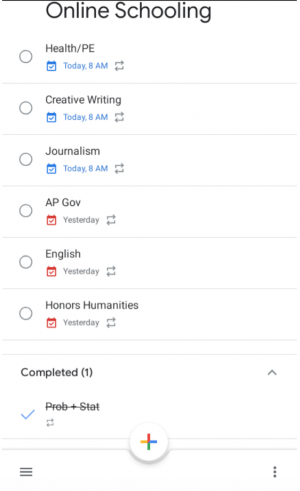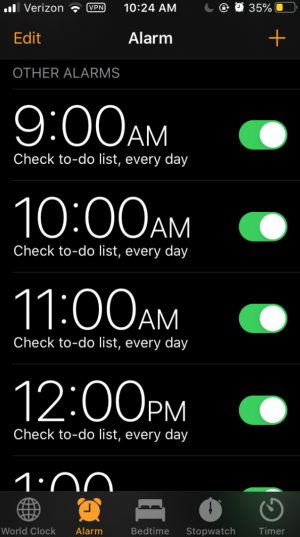Getting Things Done in Quarantine: My Suggestions
May 29, 2020
This is a stressful and potentially traumatic time for everyone. There is no “right” or “wrong” way to cope. “Getting things done” means different things to different people. For some people, it means the bare minimum: completing online assignments, taking care of personal hygiene, and maintaining a circadian rhythm. For others, it means working on a creative project, such as writing and drawing.
Personally, I want to use this time to work on writing, but it has been difficult. Just like many of you, I find myself checking Instagram every millisecond because I have to know what other people are up to, and I harbor a deep-seated insecurity around my writing, a lethal combination that often has me putting off writing projects for days, weeks, and even months. Cherry on top, I deal with various medical conditions and that often leaves me feeling fatigued or overwhelmed. Or shall we say, I’m CEO of not getting things done. But I’m stepping down.
I haven’t perfectly mastered the art of getting things done, but I’ve been making baby steps. As I write this, there’s a voice inside of my head telling me that I’m not even qualified to write this, because my baby feet are wobbling.
But every step counts. Right?
I am making progress, no matter how small it may be, and here’s how you might be able to do so, too. Of course, everyone is different but it won’t hurt to try:
Put motivational posters on view.
If you’re reading this, you probably want or need to get something done.
But in a moment of temptation, maybe one more minute on your bed or a new notification from Instagram, you forget how important the thing is for you.
Perspective matters. I know that I feel more motivated to get things done, when I think about what my actions and choices mean in the grand scheme of things.
Having a motivational quote on view will help you snap back into perspective.
This is what I have on my computer background, right now.

Similarly, if you are looking for inspiration, stick to what you have already accomplished, rather than something that will fuel self-comparison or a sense of dread. I used to read books to motivate myself to write, or obsessively use GPA calculators to study, but these things backfired by making my goals seem unattainable and therefore making me want to give up.
Install a to-do-list

Personally, I use Google Tasks, because I can remind myself on both my iPhone and my chromebook.
The obvious benefit of to-do lists is that you can remind yourself of obligations. It is easy to forget what you have to do, and when you have to finish it by, but having a to-do-list helps you eliminate mix-ups.
However, the less obvious benefits of to-do lists is the feeling of reward. When you check off a to-do-list, you physically see a list getting smaller. There’s a feeling of certainty that if you do x number of tasks, you’re done with everything for the day. That makes it feel more manageable. Furthermore, many to-do-lists also shows “completed tasks” throughout the day, and reminding yourself of what you’ve already accomplished serves as a confidence builder.
Use alarms to complement to-do-lists
When I initially started using to-do-lists (as explained above), it didn’t do much. Even though I enabled push notifications, they often got buried amongst other notifications such as Google classroom and even instagram.
And even if I paid attention to push notification, there’s only so much that push notifications can do. I’d check it when the push notification comes, then work on the first thing on the list, then forget to click back to the to-do-list to cross it off AND check for other tasks.
In other words, I have to periodically check my to-do-lists, beyond what the push notification tells me to.
Here’s where the alarm comes handy:

I have alarms every hour to remind me to check my to-do-list, and they all have different sounds every hour. The novelty of the ringtones keeps me on my toes, and prevents me from getting desensitized.
Set timers
A problem I encountered when I was writing longer pieces, like school essays and news articles and especially my personal projects was that I was working on one part for too long. I did that, because I found these parts easy, and wanted to stick to my comfort zone, rather than moving onto the harder parts. To overcome this, I use a timer. And since it’s cumbersome to set the time every time you move onto the next section, I use a sports timer app on my computer that allows me to set patterned intervals (kind of like a school schedule).
Use grounding techniques.
Feeling connected to the here and now is crucial to focus, and I personally find it helpful when I can be more mindful to my body.
I stimulate my senses through aromatherapy. Since it’s hot and I can’t use a diffuser without turning the whole house into a sauna, I close the shower drain and make a foot bath, and add 4-6 drops of strong essential oils.
I also ensure that I’m physically comfortable. I make sure I take a shower at least once a day, and I moisturize my face so I’m not distracted by how dry my face feels.


